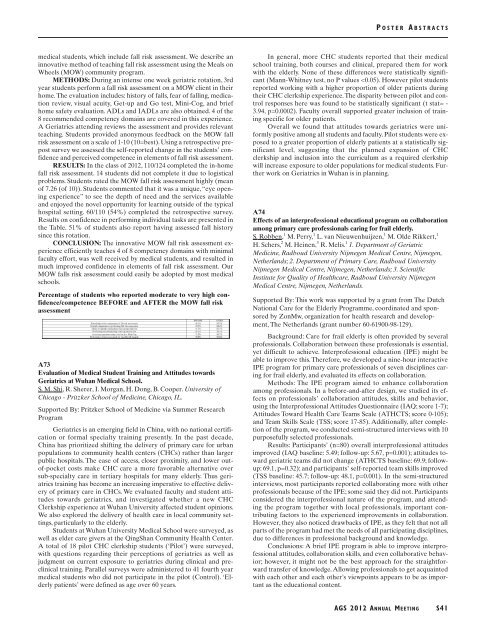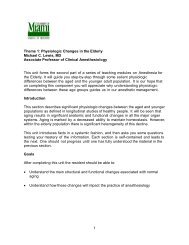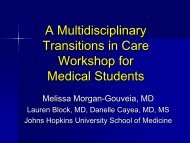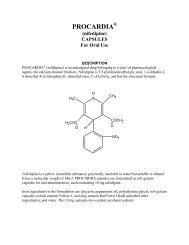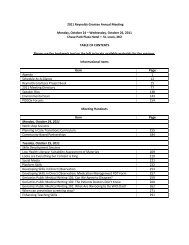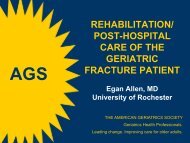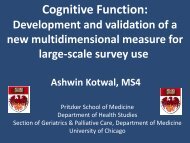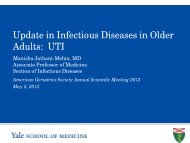Here - American Geriatrics Society
Here - American Geriatrics Society
Here - American Geriatrics Society
You also want an ePaper? Increase the reach of your titles
YUMPU automatically turns print PDFs into web optimized ePapers that Google loves.
P OSTER<br />
A BSTRACTS<br />
medical students, which include fall risk assessment. We describe an<br />
innovative method of teaching fall risk assessment using the Meals on<br />
Wheels (MOW) community program.<br />
METHODS: During an intense one week geriatric rotation, 3rd<br />
year students perform a fall risk assessment on a MOW client in their<br />
home. The evaluation includes: history of falls, fear of falling, medication<br />
review, visual acuity, Get-up and Go test, Mini-Cog, and brief<br />
home safety evaluation. ADLs and IADLs are also obtained. 4 of the<br />
8 recommended competency domains are covered in this experience.<br />
A <strong>Geriatrics</strong> attending reviews the assessment and provides relevant<br />
teaching. Students provided anonymous feedback on the MOW fall<br />
risk assessment on a scale of 1-10 (10=best). Using a retrospective prepost<br />
survey we assessed the self-reported change in the students’ confidence<br />
and perceived competence in elements of fall risk assessment.<br />
RESULTS: In the class of 2012, 110/124 completed the in-home<br />
fall risk assessment. 14 students did not complete it due to logistical<br />
problems. Students rated the MOW fall risk assessment highly (mean<br />
of 7.26 (of 10)). Students commented that it was a unique, “eye opening<br />
experience” to see the depth of need and the services available<br />
and enjoyed the novel opportunity for learning outside of the typical<br />
hospital setting. 60/110 (54%) completed the retrospective survey.<br />
Results on confidence in performing individual tasks are presented in<br />
the Table. 51% of students also report having assessed fall history<br />
since this rotation.<br />
CONCLUSION: The innovative MOW fall risk assessment experience<br />
efficiently teaches 4 of 8 competency domains with minimal<br />
faculty effort, was well received by medical students, and resulted in<br />
much improved confidence in elements of fall risk assessment. Our<br />
MOW falls risk assessment could easily be adopted by most medical<br />
schools.<br />
Percentage of students who reported moderate to very high confidence/competence<br />
BEFORE and AFTER the MOW fall risk<br />
assessment<br />
A73<br />
Evaluation of Medical Student Training and Attitudes towards<br />
<strong>Geriatrics</strong> at Wuhan Medical School.<br />
S. M. Shi, R. Sherer, I. Morgan, H. Dong, B. Cooper. University of<br />
Chicago - Pritzker School of Medicine, Chicago, IL.<br />
Supported By: Pritzker School of Medicine via Summer Research<br />
Program<br />
<strong>Geriatrics</strong> is an emerging field in China, with no national certification<br />
or formal specialty training presently. In the past decade,<br />
China has prioritized shifting the delivery of primary care for urban<br />
populations to community health centers (CHCs) rather than larger<br />
public hospitals. The ease of access, closer proximity, and lower outof-pocket<br />
costs make CHC care a more favorable alternative over<br />
sub-specialty care in tertiary hospitals for many elderly. Thus geriatrics<br />
training has become an increasing imperative to effective delivery<br />
of primary care in CHCs. We evaluated faculty and student attitudes<br />
towards geriatrics, and investigated whether a new CHC<br />
Clerkship experience at Wuhan University affected student opinions.<br />
We also explored the delivery of health care in local community settings,<br />
particularly to the elderly.<br />
Students at Wuhan University Medical School were surveyed, as<br />
well as elder care givers at the QingShan Community Health Center.<br />
A total of 18 pilot CHC clerkship students (‘Pilot’) were surveyed,<br />
with questions regarding their perceptions of geriatrics as well as<br />
judgment on current exposure to geriatrics during clinical and preclinical<br />
training. Parallel surveys were administered to 41 fourth year<br />
medical students who did not participate in the pilot (Control). ‘Elderly<br />
patients’ were defined as age over 60 years.<br />
In general, more CHC students reported that their medical<br />
school training, both courses and clinical, prepared them for work<br />
with the elderly. None of these differences were statistically significant<br />
(Mann-Whitney test, no P values


